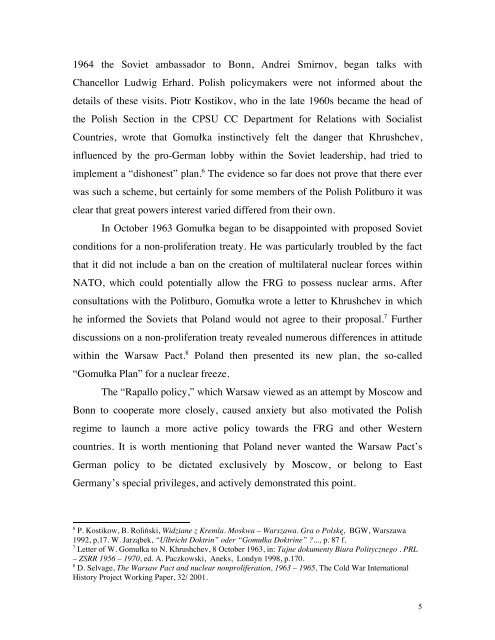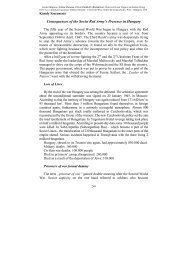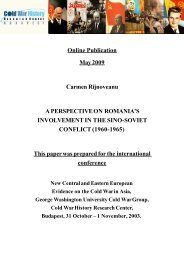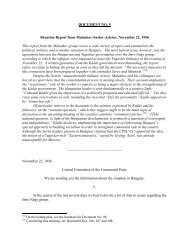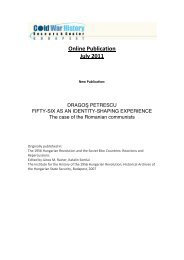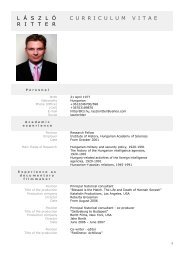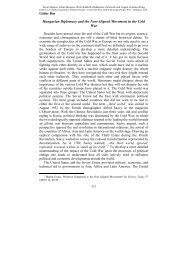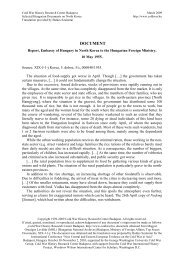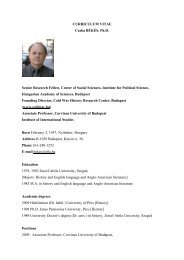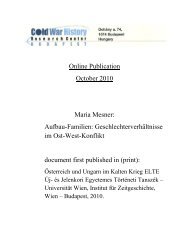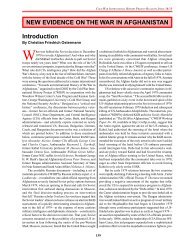Hope and Reality: Poland and the Conference on Security and ...
Hope and Reality: Poland and the Conference on Security and ...
Hope and Reality: Poland and the Conference on Security and ...
Create successful ePaper yourself
Turn your PDF publications into a flip-book with our unique Google optimized e-Paper software.
1964 <str<strong>on</strong>g>the</str<strong>on</strong>g> Soviet ambassador to B<strong>on</strong>n, Andrei Smirnov, began talks withChancellor Ludwig Erhard. Polish policymakers were not informed about <str<strong>on</strong>g>the</str<strong>on</strong>g>details of <str<strong>on</strong>g>the</str<strong>on</strong>g>se visits. Piotr Kostikov, who in <str<strong>on</strong>g>the</str<strong>on</strong>g> late 1960s became <str<strong>on</strong>g>the</str<strong>on</strong>g> head of<str<strong>on</strong>g>the</str<strong>on</strong>g> Polish Secti<strong>on</strong> in <str<strong>on</strong>g>the</str<strong>on</strong>g> CPSU CC Department for Relati<strong>on</strong>s with SocialistCountries, wrote that Gomułka instinctively felt <str<strong>on</strong>g>the</str<strong>on</strong>g> danger that Khrushchev,influenced by <str<strong>on</strong>g>the</str<strong>on</strong>g> pro-German lobby within <str<strong>on</strong>g>the</str<strong>on</strong>g> Soviet leadership, had tried toimplement a “dish<strong>on</strong>est” plan. 6 The evidence so far does not prove that <str<strong>on</strong>g>the</str<strong>on</strong>g>re everwas such a scheme, but certainly for some members of <str<strong>on</strong>g>the</str<strong>on</strong>g> Polish Politburo it wasclear that great powers interest varied differed from <str<strong>on</strong>g>the</str<strong>on</strong>g>ir own.In October 1963 Gomułka began to be disappointed with proposed Sovietc<strong>on</strong>diti<strong>on</strong>s for a n<strong>on</strong>-proliferati<strong>on</strong> treaty. He was particularly troubled by <str<strong>on</strong>g>the</str<strong>on</strong>g> factthat it did not include a ban <strong>on</strong> <str<strong>on</strong>g>the</str<strong>on</strong>g> creati<strong>on</strong> of multilateral nuclear forces withinNATO, which could potentially allow <str<strong>on</strong>g>the</str<strong>on</strong>g> FRG to possess nuclear arms. Afterc<strong>on</strong>sultati<strong>on</strong>s with <str<strong>on</strong>g>the</str<strong>on</strong>g> Politburo, Gomułka wrote a letter to Khrushchev in whichhe informed <str<strong>on</strong>g>the</str<strong>on</strong>g> Soviets that Pol<str<strong>on</strong>g>and</str<strong>on</strong>g> would not agree to <str<strong>on</strong>g>the</str<strong>on</strong>g>ir proposal. 7 Fur<str<strong>on</strong>g>the</str<strong>on</strong>g>rdiscussi<strong>on</strong>s <strong>on</strong> a n<strong>on</strong>-proliferati<strong>on</strong> treaty revealed numerous differences in attitudewithin <str<strong>on</strong>g>the</str<strong>on</strong>g> Warsaw Pact. 8 Pol<str<strong>on</strong>g>and</str<strong>on</strong>g> <str<strong>on</strong>g>the</str<strong>on</strong>g>n presented its new plan, <str<strong>on</strong>g>the</str<strong>on</strong>g> so-called“Gomułka Plan” for a nuclear freeze.The “Rapallo policy,” which Warsaw viewed as an attempt by Moscow <str<strong>on</strong>g>and</str<strong>on</strong>g>B<strong>on</strong>n to cooperate more closely, caused anxiety but also motivated <str<strong>on</strong>g>the</str<strong>on</strong>g> Polishregime to launch a more active policy towards <str<strong>on</strong>g>the</str<strong>on</strong>g> FRG <str<strong>on</strong>g>and</str<strong>on</strong>g> o<str<strong>on</strong>g>the</str<strong>on</strong>g>r Westerncountries. It is worth menti<strong>on</strong>ing that Pol<str<strong>on</strong>g>and</str<strong>on</strong>g> never wanted <str<strong>on</strong>g>the</str<strong>on</strong>g> Warsaw Pact’sGerman policy to be dictated exclusively by Moscow, or bel<strong>on</strong>g to EastGermany’s special privileges, <str<strong>on</strong>g>and</str<strong>on</strong>g> actively dem<strong>on</strong>strated this point.6 P. Kostikow, B. Roliński, Widziane z Kremla. Moskwa – Warszawa. Gra o Polskę, BGW, Warszawa1992, p.17. W. Jarząbek, “Ulbricht Doktrin” oder “Gomułka Doktrine” ?..., p. 87 f.7 Letter of W. Gomułka to N. Khrushchev, 8 October 1963, in: Tajne dokumenty Biura Politycznego . PRL– ZSRR 1956 – 1970, ed. A. Paczkowski, Aneks, L<strong>on</strong>dyn 1998, p.170.8 D. Selvage, The Warsaw Pact <str<strong>on</strong>g>and</str<strong>on</strong>g> nuclear n<strong>on</strong>proliferati<strong>on</strong>, 1963 – 1965, The Cold War Internati<strong>on</strong>alHistory Project Working Paper, 32/ 2001.5


